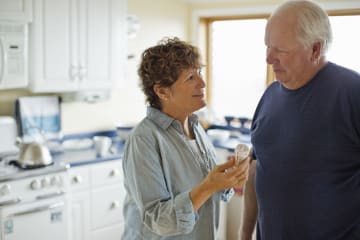What is chemotherapy?

Chemotherapy is treatment with medicines that destroy cancer cells. It's often called chemo. The medicines you take at home work just as well as the ones that are given in the hospital or clinic.
For these medicines to help you the most, you need to take them safely and correctly. The medicines you take at home can have the same side effects as the chemo that's given in the hospital or clinic. Always handle them with care. Follow your doctor's instructions about taking them and storing them.
You'll meet with your doctor or nurse often during your treatment. They will answer your questions about your medicines. You'll learn which ones you're taking and what they'll do for you. You'll also get instructions on how to take the medicines.
What are the side effects of chemotherapy?
Side effects depend on which medicines you take, how much you take, and how the medicines affect you. Your doctor can tell you what to expect when you take these medicines. Some of them may cause side effects such as:
- Fatigue.
- Nausea.
- Vomiting.
- A rash.
- Hair loss.
- Pain or tingling in your hands or the soles of your feet.
- Increased risk of infection.
Chemo treatment can be hard. It can keep you from doing the things you were doing every day, like going to work or school. But keep in mind that most side effects don't last. They will go away after you finish the treatment.
And many side effects can be managed with medicine. Your doctor will tell you what to do if you have side effects. You'll also learn which ones you need to tell your doctor about right away.
How can you use chemotherapy safely?
Be safe with your chemo medicines. Take them exactly as prescribed. Call your doctor if you think you are having a problem with them.
Make a daily schedule of your medicines. Then you'll know ahead of time when to take them. Put your schedule where you will always see it or add alerts to your electronic devices.
Read any instructions that come with your chemo medicines. Follow all directions about how to handle, take, and store them. Caregivers should follow these directions too.
Use care
Chemo medicines are powerful chemicals. Don't touch the pills with your bare hands. Wear disposable gloves when you handle the pills. Wash your hands when you're done. Don't handle chemo medicines if you are pregnant or breastfeeding.
It's important to keep others from touching the pills too. Keep them away from children and pets.
Take your medicines safely
- When you take a pill, pour it from the bottle into the bottle cap, a spoon, or a disposable medicine cup. Then tip it into your mouth and swallow.
- Don't crush, break, or chew the pills. Talk to your doctor if it is hard for you to swallow them.
- Don't change or skip a dose, unless your doctor says to. Call your doctor right away if you miss a dose or take too much.
- If you vomit a dose of your medicine soon after you take it, call your doctor right away.
Store your medicines safely
- Store your chemo medicines in the containers they came in. Don't let the chemo pills touch other medicines.
- Don't store your chemo medicines near food or drinks or in places where you eat. Don't store them in direct sun or in damp places.
- Keep your medicine in a locked cabinet if you can. Or keep it on a high shelf out of the reach of children. Make sure the containers have childproof lids.
Be safe with body fluids
The chemicals in the medicine leave your body through vomit, urine, or stool. The chemicals can stay in your body fluids for several days after your last treatment. So don't let anyone touch any waste from your body. Have caregivers use gloves when washing clothing or bed linens that have body fluids on them. And wash your clothing or linens separately from other items, including other linens and clothes. Wash them twice in hot water with regular laundry detergent.
For at least 48 hours after treatment:
- Use a different toilet from the rest of the household, if available.
- Sit on the toilet seat to prevent splashing.
- Put the toilet lid down before you flush.
- Always flush twice after using the toilet.
Also, couples should use a condom during sex while a partner is getting chemo treatments and for several days after treatment ends. Ask your doctor if it's okay to have sex during treatment.
Caregivers
Caregivers should always wear two pairs of disposable gloves when handling chemo medicines or when coming into contact with body fluids. They should wash their hands before and after putting on gloves. It's best to have as few caregivers as possible handle the chemo.
What else should you know?
Tell your doctor about all the medicines you take. This includes over-the-counter medicines and supplements. Talk with your doctor before you take any new medicines or supplements. The doctor can tell you if it's safe to take them while you are on chemotherapy. If you visit other health care providers, such as a family practice doctor or your dentist, be sure to let them know you are on chemotherapy.
You might not have any chemo medicine left when you finish treatment. But if you do, follow your doctor's instructions about what to do with it. You may have to take it back to the pharmacy for safe disposal.
Current as of: October 25, 2024
Author: Ignite Healthwise, LLC Staff
Clinical Review Board
All Ignite Healthwise, LLC education is reviewed by a team that includes physicians, nurses, advanced practitioners, registered dieticians, and other healthcare professionals.

